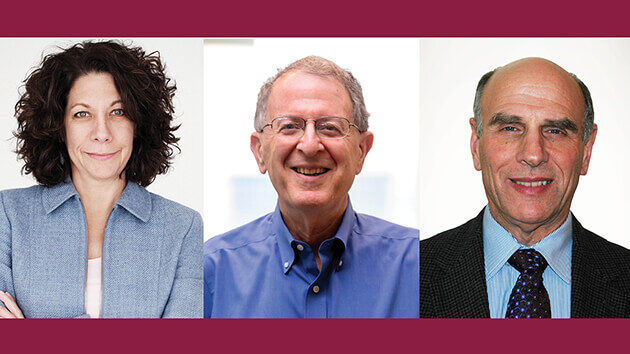2023 Albany Prize Awarded

The 2023 Albany Medical Center Prize in Medicine and Biomedical Research has been awarded to three scientists whose research has advanced the study and understanding of the microbiome, bacteria, and how they communicate in the body and their role in disease and health.
They accepted the award at a special ceremony in Albany on Oct. 5.
The recipients are:
- Bonnie L. Bassler, PhD, Squibb Professor & Chair, Department of Molecular Biology, Princeton University; Investigator, Howard Hughes Medical Institute
- Jeffrey I. Gordon, MD, Dr. Robert J. Glaser Distinguished University Professor, Director, The Edison Family Center for Genome Sciences & Systems Biology, Washington University School of Medicine
- Dennis L. Kasper, MD, William Ellery Channing Professor of Medicine, Professor of Immunology, Harvard Medical School; Senior Physician, Brigham and Women’s Hospital
The collective work of Drs. Bassler, Gordon, and Kasper has helped the world understand the roles played by our microbiomes – the complex and dynamic communities of microorganisms with their vast arsenal of microbial genes that dwell in different locations in our body.
Dr. Bassler pioneered investigating how bacteria “talk” to each other across species and coordinate their behavior. Her work has shown that disrupting this communication can prevent bacterial infection, paving the way for new antibiotics.
Dr. Gordon developed the field of human microbiome research and revolutionized our understanding of how variations in gut microbial communities affect health and disease – including the nutritional status of infants and children living in low-income countries – and how this knowledge can yield new approaches for treating the global health challenge of malnutrition.
Dr. Kasper was the first to discover that the gut microbiome was critical to development and modulation of the immune system and to explain the mechanisms for this interaction, which is vital to health. The findings of his work have implications for a range of immune-mediated disorders, including inflammatory bowel disease, rheumatoid arthritis, and lupus.
Each scientist is credited with advancing this scientific area of study that began more than 150 years ago. Their research impacts myriad facets of human biology throughout our lifespans.
“I am honored to present the Albany Prize to three pioneering scientists whose work has led to greater knowledge of the microbiome and its impact on gut health and disease, immune system function, immune-mediated diseases, and nutrition,” said Alan S. Boulos, MD ’94, The Lynne and Mark D. Groban, MD ’67 Distinguished Dean of Albany Medical College and chair of the National Selection Committee. “Their work is leading to advances in research and improved global health, including our ability to battle infectious diseases and potentially other common human conditions.”
In 2000, the Marty and Dorothy Silverman Foundation dedicated $50 million to award the $500,000 Albany Prize annually for 100 years. It is intended to encourage and recognize extraordinary and sustained contributions to improving health care while promoting innovative biomedical research. It is one of the most significant prizes in medicine and science in the United States. Drs. Bassler, Gordon, and Kasper will share the prize.
Each recipient is nominated by their peers.
“Dr. Bassler’s research provides a completely new way to think about microbes and, moreover, how to combat them. Pathogenic bacteria claim millions of human lives per year,” wrote Ned S. Wingreen, PhD, associate director of the Princeton Center for Theoretical Science, who nominated Dr. Bassler. “Quorum sensing [cell-to-cell communication] plays an essential role in virulence. We know this, in large part, because of Bonnie Bassler’s extraordinary research. She has provided humanity with unprecedented new possibilities for antimicrobial development.”
In his nomination of Dr. Gordon, David Perlmutter, MD, Washington University’s executive vice chancellor for Medical Affairs, wrote, “Global food insecurity is forecast to sharply increase due to such factors as climate change, health and economic disparities, land and water shortages, and geopolitical upheaval. Dr. Gordon’s pioneering interdisciplinary work at the interface between microbial science, food science, and nutritional science is creating new approaches for addressing this challenge.”
Anthony S. Fauci, MD, former director of the National Institute of Allergy and Infectious Diseases and a distinguished university professor at Georgetown University’s School of Medicine and McCourt School of Public Policy, nominated Dr. Kasper, writing, “He has discovered and highlighted key molecules that have important therapeutic potential. Most importantly, he has provided a central understanding of the vast importance of the microbiome in the development and regulation of the immune system. His work provided mechanistic insights and pathways of exploration for others to investigate the immune and other organ systems.”
Two previous Nobel Prize winners have been among the ranks of researchers honored, and ten Albany Prize recipients have gone on to win the Nobel Prize, including Katalin Karikó, PhD, and Drew Weissman, MD, PhD, for their discoveries that enabled the development of effective mRNA vaccines against Covid-19; James P. Allison, PhD, for his development of immune checkpoint blockade to treat cancer; Shinya Yamanaka, MD, PhD, a leading stem cell scientist; Elizabeth Blackburn, PhD, who discovered the molecular nature of telomeres; Bruce Beutler, MD, and the late Ralph Steinman, MD, for their discoveries regarding the detailed workings of the immune system; Robert Lefkowitz, MD, for his work on cell receptors; and Emmanuelle Charpentier, PhD, and Jennifer Doudna, PhD, for their development of a method of genome editing.